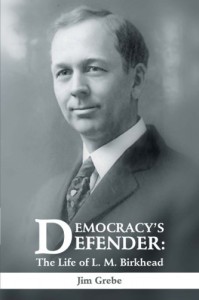Book Review: Democracy’s Defender: The Life of L.M. Birkhead by Jim Grebe

Jim Grebe’s book Democracy’s Defender: The Life of L.M. Birkhead presents the life of a Methodist minister-turned humanist Unitarian minister-turned social activist. Born in Missouri in 1885, Leon Milton Birkhead was a man of reason and civic virtue, with views enlightened for his time and place, someone unafraid to express those views publicly and argue for them.
He also was on the fringe of many national stories and movements, including being an assistant to Eugene Debs during the Scopes Monkey Trial and being a friend and resource for author Sinclair Lewis (and likely the basis for the minister character in Elmer Gantry).
Birkhead began as a Methodist minister in Wichita, Kansas in 1915, quickly establishing himself as a liberal voice in a conservative city. It soon became clear he was too liberal in his views to continue with Methodism, and he left in 1917 to take the minister’s post at a Unitarian Church in Kansas City, Missouri–a position he held in one form or another through 1939. He was a pastor in the Unitarian Church during its close alliance with the Humanist Movement and he actively pushed his congregation in the direction of humanism. In fact, he was a force behind, and signatory of, the first Humanist Manifesto in 1933.
Trips to Germany in the 1930s convinced Birkhead that fascism was a threat to the entire world. Early on, he advocated for entering the fight against Hitler, even as his more liberal friends felt a peaceful end to the European conflict was still possible. Never one to shy away from where his reasoning led him, however, he continued the fight. He left the ministry to run the watchdog agency Friends of Democracy (first in the Midwest and later in New York City), shining a light on the dangers of fascism both abroad and at home. He continued this watchdog effort even after the war, feeling that fascism was still a threat to be confronted right up until his death in 1954, a period during which his efforts took him farther and farther away from mainstream liberal thought.
Birkhead’s life is the type we need more of in our world: that of a principled man who goes where his reason and intelligence takes him and tries (and to an extent–does) take those friends and neighbors he can convince with him.
That being said, it’s questionable whether or not this biography will be of interest outside of those who directly know of him, or who are familiar with the areas of Kansas City and the intellectual life of the Midwest in the 1920s and 1930s, or, later on, the fringes of intellectual life in New York City in the post-war years.
Author Jim Grebe does a straightforward job of reporting Birkhead’s expressed views and attempts to rally others. His writing is clear and concise, although the constant sourcing of many quotes and writings within the text slows the narrative down. A better choice would have been to let his extensive endnotes do this work on their own, and allow the narrative to flow. His book relies principally upon public records, of which there are many, but the biography is missing any sense of Birkhead’s interior monologue. There are no letters or diaries of substance to put the public statements into a more personalized context. Without these types of sources, Grebe is not able to reconstruct those thought processes which may have made Birkhead’s life more compelling to the general reader.
The history of freethought and humanism in America has largely been largely unexplored, and that might lead some to conclude that it was non-existent in the 1920s & 30s Midwest. With Democracy’s Defender, Jim Grebe helps show that there is indeed a vibrant and far-reaching history of civic involvement and humanist engagement, as much as many would like to dismiss it.
